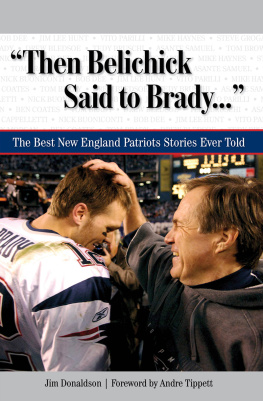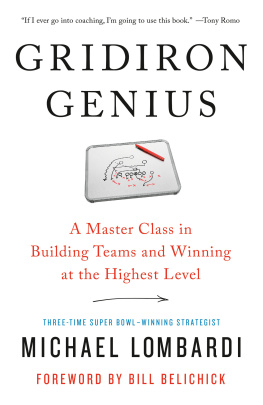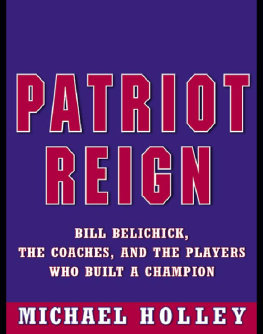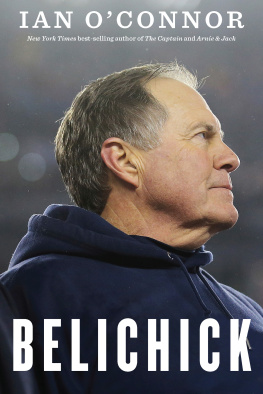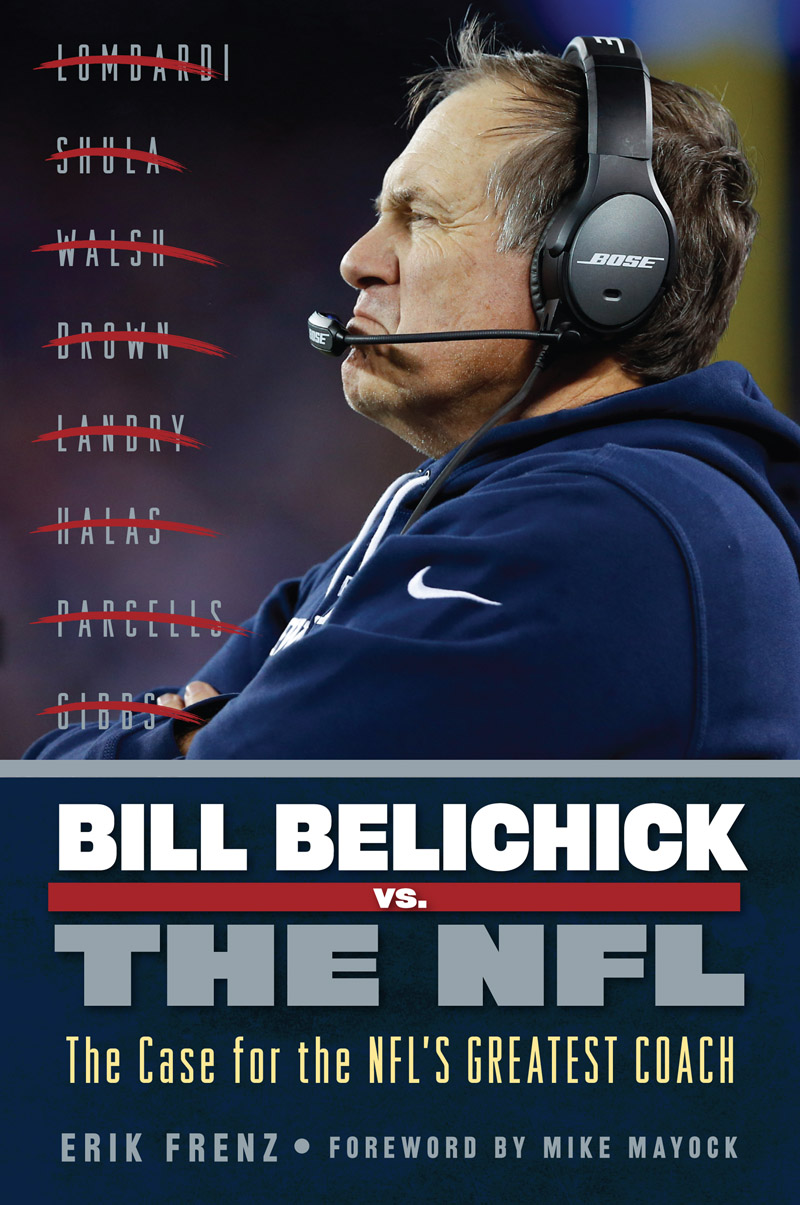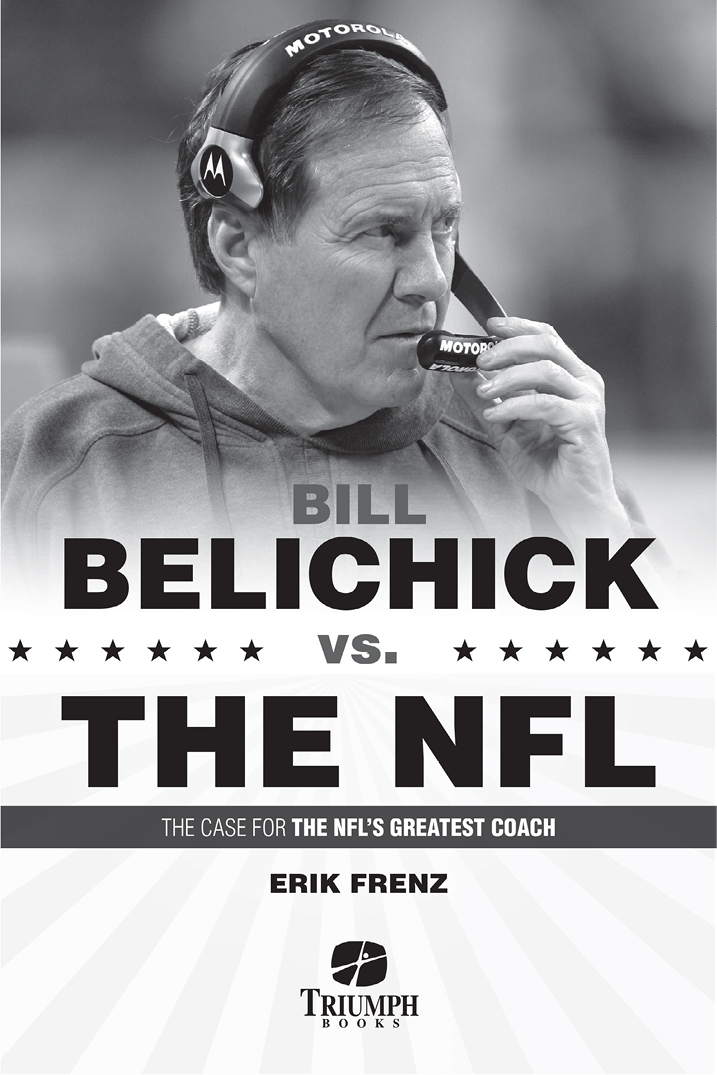
To Mom, Dad, and Alison.
Contents
Foreword by Mike Mayock
I first met Bill Belichick in 1982 when I was 23 years old and a long shot to make the New York Giants football team as a free agent. Bill was only six years older, but three things were immediately apparent: he was intense, he was incredibly detail oriented, and he had a gift for teaching. Bill coached the special teams and linebackers, and I knew right away that this guy was going to be a terrific coach.
Since joining NFL Network in 2005, I have closely followed his career and further realized what a special coach he is. How special? Well, in this book, Bill Belichick vs. the NFL , Erik Frenz makes a compelling argument that Bill Belichick is the greatest NFL coach of all time. To make his case, Frenz tackles the statistical variations between Belichick and most of the great coaches throughout NFL history while being fair and measured in the differences in coaching at different times in NFL history.
The conversation weaves in and out between George Halas, Paul Brown, Vince Lombardi, Chuck Noll, Bill Walsh, Bill Parcells, and Tom Coughlin, among other bright, inventive, and successful coaches. Can anyone match the longevity of Halas, who coached for 40 years? Was Brown the best coach of all time? Perhaps he was the most innovative. How about the iconic Lombardi, for whom the Super Bowl trophy is named? Noll and the Pittsburgh Steelers were a machine in the 1970s with a multitude of NFL Hall of Famers to prove it. The myriad branches of Walshs coaching tree remain successful, while Belichick coached alongside Parcells and Coughlin.
Though Frenz takes great pains to pay respect to these great coaches while profiling their backgrounds and respective places in NFL history, his overriding theme is that not only do the numbers support his claim, but also the continued evolution of Belichick as a coach and his significant impact on the game make him the best ever. During his 16 years guiding the New England Patriots, Belichick has won 73 percent of his 256 regular-season games, 13 AFC East titles, four Super Bowls, and reached double-digit victories in 13 consecutive seasons. Frenz details Belichicks transition from a defensive mastermind to an offensive-minded head coach whose teams routinely average close to 30 points per game while rarely turning the ball over.
Bills genius is that he fully understands what each player on his roster can do, and he puts him in the best position to execute. When you combine that with an uncanny ability to gameplan every opponent and to be more prepared than any team I have ever seen, its hard to argue that Belichick shouldnt be on the short list for every football fan.
This book is like a great barroom conversation. Each reader will come to their own conclusions as to the greatest NFL coach of all time. All I know is that Bill Belichick has to be a very prominent name in that conversation.
Mike Mayock
NFL Network analyst
Introduction
Its one thing to make a case for a player as the best of all time. His impact can be quantified by his performance on the field. Quantifying a coach, however, is tricky.
The win-loss record has to be part of the discussion and so do championships at the division, conference, and league level, but theres no practical way to measure how much of an impact the strategies have on each play of each game. Some coaches have won more games, more NFL championships, and/or more division titles than other coaches, but it would be inaccurate to plug those numbers into an equation for the best head coach of all time.
The years have changed the game. Todays coaches deal with a completely different set of circumstancesfrom rules that have altered the playing of the game to offseason free agency, which have changed the team-building standard. Who knows how successful any of these coaches would have been in another era? That being said, Bill Belichicks run of success in this era measures up to the success of any coach before him in his own era.
Over the years the NFL has done everything in its power to eliminate the ability for one team to remain at the top for an extended period of time. These rules are also designed to help teams at the bottom get better. Free agency and the draft are the two main weapons of this parity; the best teams cant keep everyone, and the worst teams get the first choice of new, young players to add to the roster.
The Patriots have defied the unwritten laws of parity since 2000 with 209 combined regular-season and postseason wins, 78 combined losses, 13 AFC East championships, six AFC championships, and four Super Bowls. Each of those marks is more than any other team in that time. Belichick wasnt supposed to be this successful, but he has overcome stacked odds to achieve that success. In a sense it truly has been Bill Belichick vs. the NFL.
* * *
I was six in 1992, when I saw football for the very first time on the television downstairs in my childhood home in Maine. By the time I was a senior in college, I already had witnessed two NFL dynasties: the golden days of the Dallas Cowboys from 199295 and the New England Patriots out-of-nowhere 200104 run. Those two dynasties were separated by just six years. Eight of my first 14 years as a football fan were heavily dominated by two teams.
I thought thats the way it was supposed to be. Up until recently, I was right.
The Patriots dominance is remarkable, if not unbridled, in the free agency era. Its an era that forces teams to constantly change their nucleus. In that respect Belichick is the perfect coach for this day and age. Year to year and even week to week, Belichick is willing to adapt his philosophy to do what is best for his team to win. He is able to stay ahead of the curve by going against the grain of the NFL. One of the things weve tried to do is be a little bit of an outlier in some respects, Belichick said as the keynote speaker at 2016 Salesforce World Tour. When I came to the Patriots in 2000 as the head coach, we played a 3-4 defense and we only had two teams in the NFL, us and the Pittsburgh Steelers, who played a 3-4. We had quite a bit of success, won three Super Bowls in four years, and by 2005 half the league was playing a 3-4 defense. So when I came here trying to find a nose tackle like Ted Washington, it was easy because no one else wanted him. Five years later, if we were looking for a nose tackle, there were probably five other teams in the draft ahead of us. Weve kind of had to find different players, different schemes, whether it be tight end-based offenses or whether it be going from an odd to an even front defensively, whatever it happened to be, trying to find different ways to capitalize on the talent thats available. Otherwise, were going to get like the fifth, sixth, seventh best guy at whatever the position is. So weve tried to take more of our way in areas that are less populated.
The league forces teams to constantly change their rosters, so Belichick is constantly evolving to account for those changes. Who knows how successful he could have been if he never had to worry about expiring contracts? Vince Lombardi never had to worry about free agency when it came to Hall of Famers like running back Paul Hornung, linebacker Ray Nitschke, and quarterback Bart Starr, who played every down of their careers for the Green Bay Packers during Lombardis time as the coach.
Maybe the Patriots would never have missed a step from 200513 if they didnt have to move on from so many of their key players due to contracts and salaries. Maybe, with a veteran-laden group, they would have still taken steps back. What makes it interesting, though, is that Belichick doesnt often lose big-name players to expiring contracts. Yes, its happened on occasion; kicker Adam Vinatieri, cornerback Asante Samuel, and wide receiver Wes Welker can attest to that. There are far more examples, however, of Belichick cutting ties while it still can benefit the Patriots in some way. Take, for example, the Patriots trades of wide receiver Deion Branch (2006), defensive end Richard Seymour (2009), wide receiver Randy Moss (2010), left guard Logan Mankins (2014), and most recently, defensive end Chandler Jones (2016). Belichick has taken free agency, which is supposed to be a means of taking the best teams down a peg, and has turned it into a means of maintaining prolonged success.


